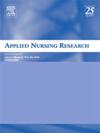Educational needs of patients with pre-cancerous vulval conditions: An audit and cross-sectional survey
IF 2.2
4区 医学
Q1 NURSING
引用次数: 0
Abstract
Background
A systematic approach to surveillance of vulval dermatoses and pre-cancers is recommended for early detection of vulval cancer and nurses are crucial in care delivery. Typically, patients with gynaecological cancers have significant unmet information needs; however the extent in patients with vulval dermatoses and pre-cancers is unknown.
Aim
To evaluate knowledge gaps and educational requirements of patients attending vulvoscopy clinics at a Western Australian tertiary centre.
Methods
A retrospective audit examined data of 307 patients attending vulvoscopy clinics. A cross-sectional survey collected quantitative and qualitative data from 61 clinic attendees between January 2024 and March 2024. Data underwent descriptive statistical and content analysis.
Results
Most audited patients attended with vulval intrepithelial neoplasia, vaginal intraepithelial neoplasia or lichen sclerosus diagnoses (n = 212; 69 %). Most survey respondents (n = 49; 84 %) were confident in vulval care, however, almost half (n = 27, 46 %) self-reported ‘low’ knowledge. In explaining their condition, most (n = 23; 48 %) provided symptom descriptions.
Face-to-face appointments with a health professional was the preferred way to receive education (n = 48; 79 %). There was interest in attending nurse-led support group or education sessions. Most (n = 50; 85 %) indicated they would use an information pack including various resource formats.
Conclusions
Patients know how to effect vulval care but may not understand why. Nurses are key to providing trusted care in conditions commonly associated with stigma and embarrassment. Development of nurse-led strategies to provide support and education, may assist reducing the risk of progression to cancer. Future research evaluating nurse-led interventions will support best practice and improve outcomes for people living with vulval conditions.
外阴癌前病变患者的教育需求:审计和横断面调查
背景为及早发现外阴癌,建议采用系统的方法监测外阴皮肤病和癌前病变,而护士在提供护理方面至关重要。通常情况下,妇科癌症患者有大量信息需求未得到满足;但外阴皮肤病和癌前病变患者的信息需求未得到满足的程度尚不清楚。目的评估西澳大利亚州一家三级中心外阴镜检查门诊就诊患者的知识差距和教育需求。一项横断面调查收集了 2024 年 1 月至 2024 年 3 月期间 61 名门诊就诊者的定量和定性数据。结果大多数接受审计的患者诊断为外阴上皮内瘤变、阴道上皮内瘤变或苔藓样硬化(n = 212;69%)。大多数调查对象(n = 49;84 %)对外阴护理有信心,但也有近一半的调查对象(n = 27,46 %)自称对外阴护理知识 "知之甚少"。在解释病情时,大多数受访者(n = 23;48 %)都提供了症状描述。接受教育的首选方式是与医疗专业人员面对面预约(n = 48;79 %)。人们对参加由护士领导的支持小组或教育课程很感兴趣。大多数人(n = 50;85 %)表示会使用包括各种资源形式的信息包。在通常与耻辱和尴尬相关的情况下,护士是提供值得信赖的护理的关键。制定以护士为主导的策略来提供支持和教育,可能有助于降低恶化为癌症的风险。对护士主导的干预措施进行评估的未来研究将支持最佳实践,并改善外阴疾病患者的治疗效果。
本文章由计算机程序翻译,如有差异,请以英文原文为准。
求助全文
约1分钟内获得全文
求助全文
来源期刊

Applied Nursing Research
医学-护理
CiteScore
4.50
自引率
0.00%
发文量
65
审稿时长
70 days
期刊介绍:
Applied Nursing Research presents original, peer-reviewed research findings clearly and directly for clinical applications in all nursing specialties. Regular features include "Ask the Experts," research briefs, clinical methods, book reviews, news and announcements, and an editorial section. Applied Nursing Research covers such areas as pain management, patient education, discharge planning, nursing diagnosis, job stress in nursing, nursing influence on length of hospital stay, and nurse/physician collaboration.
 求助内容:
求助内容: 应助结果提醒方式:
应助结果提醒方式:


